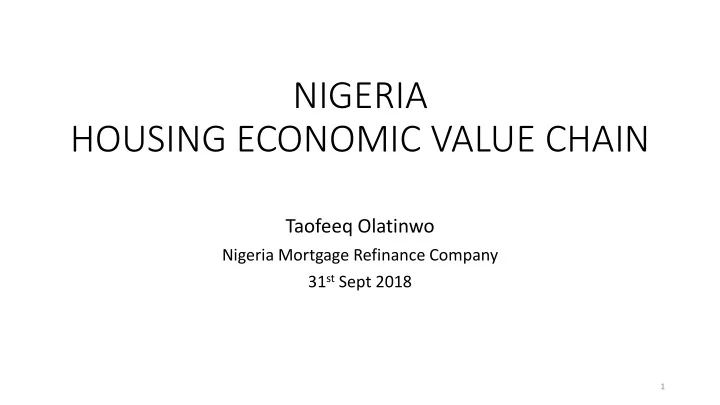

NIGERIA HOUSING ECONOMIC VALUE CHAIN Taofeeq Olatinwo Nigeria Mortgage Refinance Company 31 st Sept 2018 1
CONTENTS • An overview of your local context and the key issues • Engagement with the findings • Next steps for better understanding the impact of housing on the Nigerian economy both in terms of growth and job creation: what are the policy considerations? How might the private sector engage? What other research needs to be undertaken? 2
OVERVIEW • Population ~ 200M • Housing Deficit ~ 17M • Shortage of skilled labour • Data on Housing is insufficient 3
REVIEW: 1 of 2 Review of Comparing Housing Economic Value Chains in Four African Countries, by David and Keith • Based on the preliminary analysis, Nigeria’s total residential construction domestic production was $7,2 billion in 2016. • This is calculated to include 45%, or $3,4 billion of intermediate inputs combined with 55% ($3,8 billion) of gross value added. • This is estimated to comprise 1,4% of Nigeria’s GDP, a significantly higher proportion than South Africa’s estimated 0,9%. 4
REVIEW: 2 of 2 • Indicates the strong impact residential construction has on Nigeria’s local economy. • Nigeria’s residential rental value chain is calculated to have a domestic production in 2016 of $15-billion, comprising $9,7 billion in gross value added combined with $5,3 billion of intermediate inputs. • Provisional estimates of employment in construction sector is over 2,6 million jobs. 5
NIGERIA POLICY AND INITIATIVES • National Housing Policy 2012 • WorldBank – Nigeria Housing Finance Programme (CBN) • Program 1: Mortgage Refinance Company • Program 2: Microfinance Housing • Program 3: Mortgage Guarantee • Program 4: Technical Assistant – Advocacy, Housing Market Information, Mortgage Asset Registry System • Presidential Task Force on Housing • Family Homes Funds Ltd (4 Funds) • Fund 1: Supply Side – Civil Servants with low income • Fund 2: Home Loans Assistant Programme • Fund 3: Rental – Social Intervention • Fund 4: Land Development Fund 6
HOUSING VALUE CHAIN APPROACH • NMRC Housing Market System • Land Titling, Off-takers, Construction Finance, Primary Mortgage and Secondary Mortgage • Survey data (Household, Administrative, Financial) • Operational Data • National Real Estate Data Collation and Management Programme • CBN (Statistics Dept), NMRC, Real Estate Development Association of Nigeria, Federal Ministry, FBMN, NBS, NPopC • Others: Rent-To-Own 7
NEXT STEPS - HEM • Alignment of Data definition and gathering with CAHF • Work with Central Bank of Nigeria – Statistics Department and National Housing Finance Programme • Federal Ministry of Power, Works and Housing • Partner with NIQS, NIOB and NIESV • Data collection from Family Homes Funds, FHF 8
THANK YOU!!! 9
NIGERIA GDP $492.986 billion (nominal; 2016) $1.118 trillion (PPP) (2017 est.) GDP rank 30th (nominal) / 23rd (PPP) GDP growth 2.1% (2016) GDP per capita $2,758 (nominal) $6,184 (PPP) GDP by sector Agriculture: 21.6% Industry: 18.3% Services: 60.1% (2017 est.) Inflation (CPI) 16.3% (2017 est.) Population 33% (2013) below poverty line Gini coefficient 43.0 (2010) Labour force 74 million (Q2 2015) Labour force by Accommodation, food, transportation and real estate: 12.2% occupation Education, health, science and technology: 6.3% Farming, forestry and fishing: 30.5% Manufacturing, mining and quarrying: 11.3% Retail, maintenance, repair, and operations: 24.9% Managerial, finance and insurance: 4.2% Telecommunication, arts and entertainment: 1.8% Other services: 8.8% (2010) Unemployment 13.9% (Q3 2016) Main industries cement, oil refining, construction and construction materials, food processing and food products, beverages and tobacco, textiles, appareland footwear, pharmaceutical products, wood products, pulp paper products, chemicals, ceramic products, plastic and rubber products, electrical and electronic products, base metals: iron and steel, information technology, automobile manufacturing, and other manufacturing (2015)
Ease-of-doing- 169 (2017) business rank
Recommend
More recommend